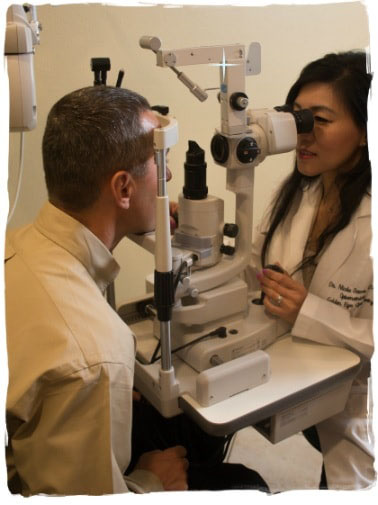For many people, good vision means good eye health. But that is not necessarily true. Regular eye exams can catch problems before it's too late and that alone can be the difference in saving your vision.

Changes in your eyesight happen, and sometimes they can happen with no warning, especially after you reach the age of 40. Once you reach 40, near vision can decline, and you may have a difficult time reading or doing close-up work. If you have glasses, you may also need a new prescription.
Wondering when to get an eye exam? If it’s been a while or you’ve never had one, you should know that your eyes benefit from checkups just like the rest of you. Read on to learn why age 40 is important and when to get an eye exam at other ages.
Do I really need to get an eye exam?
Yes, even if you think your eyes are healthy. Getting an eye exam before problems appear helps your physician establish a basis—what doctors call a “baseline”—for later exams, when eye problems become more likely.
Your eyes can also give important clues to your general health.
You’ve heard the saying “Life begins at 40?” Preventive eye care should, too. The risk of eye disease and other health conditions rises with age, and several of the most common eye diseases, including glaucoma and diabetic eye disease, cause no symptoms at first. Without regular eye exams, these diseases can cause significant damage before being found.
Why an age 40 eye exam?
Getting an eye exam at 40 is important because age-related changes tend to start appearing around now. You might have noticed some already. Do you find yourself enlarging the font on your computer screen or avoiding night driving? Those could be signs of age-related change.
What happens at a general eye exam?
Your eye doctor examines the front and back parts of your eye and does some tests to check your eye health.
How often should you get your eyes checked after age 40?
After you turn 40, we suggest coming in for an annual eye exam. Understanding how often you should get your eyes checked after age 40 is essential because regular appointments can help your eye doctor detect vision issues and track their progress.
Once we reach our 40s, our eyesight can change, and seeing up close can become challenging. This is called presbyopia. Presbyopia is normal, but because it happens, you may need a new prescription for glasses, which may include progressive lenses or multifocal lenses.
Due to the changes that can happen to your eyes as you get older, annual eye exams are paramount. Also, if you’re experiencing symptoms such as blurry vision, eye strain, or trouble seeing while driving at night, it’s time to get your eyes checked.
How often should you go to the eye doctor if you wear glasses?
If you’ve found yourself not being able to see as well as you once did through your old pair of glasses, you may wonder how often you should go to the eye doctor if you wear glasses. Unless you have problems seeing through your glasses, you can keep the same schedule of having an eye exam every year. But, if you do have a vision issue, you’ll want to schedule an eye exam right away, even if it’s before the 1-year mark.
Presbyopia can continue to develop as you age, so a new prescription may be in order. The prescription can also change from time to time, which is why you should get your eyes checked once per year after age 40.
Summary: When to Get an Eye Exam After Age 40
Unless you are at high risk for eye diseases, how often you should get your eyes checked after age 40 and how often to get an eye exam if you wear glasses is once per year. Getting older can come with presbyopia, so you’ll need to have your eyes tested on an annual basis to continue to do the up-close activities you know and love, such as reading.
At your annual eye exam, the eye doctor will also make sure your prescription is up to date. Keep appointment reminders on your phone or computer so that you won’t miss your next exam. After all, it is critical to healthy vision.
References:
For more information regarding your benefits, special offers, and eye care information feel free to contact us ![]()
![]() or
or
Age as a big factor of vision changes really alarms me. I can’t deny how old I’ve been getting over they ears, so I better take this more seriously before my vision ends up becoming worse permanently. I’ll start looking for any optometrists that can help me out with this immediately so I can get regular exams.